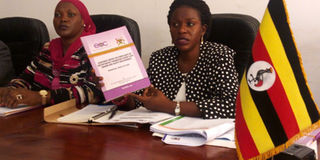Six sectors to miss budget allocation for FY 2017/18

The chairperson of the Equal Opportunities Commission, Ms Sylvia Muwebwa Ntambi (right) shows the report while Ms Zaminah Malole, a member of the commission, looks on. Photo by Ephraim Kasozi
Kampala- Six sectors, including Parliament are set to miss out on budget allocations, for failure to comply with gender and equity requirements for the financial year 2017/18, the Equal Opportunities Commission (EOC), has directed.
According to the assessment report released in Kampala recently, three sectors including Lands, Housing and Urban Development, Energy and Mineral Development and that of Accountability did not achieve the minimum qualifying score on gender and equity in their Budget Framework Papers (BFP) while Justice, Law and Order Sector, Public Sector Management and Legislature did not submit.
The chairperson of the EOC, Ms Sylvia Muwebwa Ntambi, said the sectors must not be issued a certificate of gender and equity compliance until the necessary requirements are fulfilled in their BFPs.
The Public Finance Management Act of 2015 mandates the minister of Finance to issue a certificate certifying that the BFPs of the respective sectors are gender and equity responsive in consultation with the EOC.
However, Ms Ntambi revealed that 13 out of the 16 sectors submitted their BFPs where 10 of them qualified after attaining the pass mark of 50 per cent and above.
She explained that the purpose of the gender and equity assessment is to realise sustainable inclusive growth and development as provided for under the National Development Plan II of 2015/16 – 2019/20.
“Gender and equity budgeting ensures that the different needs and interests of men, women, youth, special needs education, children, ethnic minorities, older persons, rural poor, marginalised groups and disadvantaged regions and or locations are accommodated and addressed in all sector the sector BFPs,” said Ms Ntambi while addressing journalists in Kampala.
Qualified sectors
Sectors that qualified include social development which scored 88 per cent, health (72 per cent), security (66 per cent), education (64 per cent), water and environment (64 per cent), public administration (64 per cent), ICT (59 per cent), tourism, trade and industry (57 per cent), agriculture (51 per cent) while works and transport scored 50 per cent.
Ms Ntambi observed the limited capacity of sectors in gender and equity budgeting, planning and programming while some sectors had declined in their performance.
“It was very challenging to ascertain the amount of money allocated to outputs that explicitly promote gender and equity for all the sector BFPs,” she added.
Ms Zaminah Malole, a member of the Commission explained that the assessment is intended to enable sectors apply gender and equity in their budgets and plans as a roadmap to achieve inclusive sustainable development goals.
“We want to see value for money and budgets touching the livelihoods of people. With this kind of arrangement, issues will be spelt out and reflected as people-centred,” Ms Malole said.
What the law says
The Act. The Equal Opportunities Commission Act, 2007 gives the Commission quasi-judicial powers for dispensing social justice through its tribunal which is operational and it will be the main facility within this Commission for accessing Social Justice.
Section 15 (4) (b) of the Equal Opportunities Commission Act, 2007 provides that in the discharge of its functions, the Commission may recommend to or order any institution, body, authority or person to adopt or take particular steps or action which, in the opinion of the Commission will promote equal opportunities.




